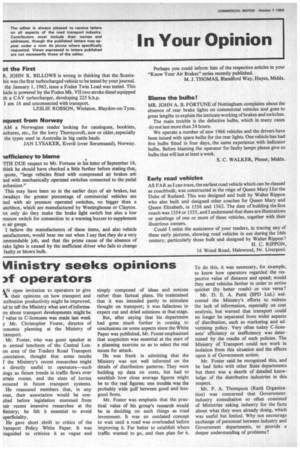Vlinistry seeks opinions 3f operators
Page 66

If you've noticed an error in this article please click here to report it so we can fix it.
/iN open invitation to operators to give A their opinions on how transport and stribution productivity might be improved, ad to tell the Ministry what sort of informson about transport developments might be f value to C-licensees was made last week y Mr. Christopher Foster, director of :onomic planning at the Ministry of ransport.
Mr. Foster, who was guest speaker at le annual luncheon of the Central Lonon area of the Traders Road Transport Lssociation, thought that some results f the Ministry's recent researches might e directly useful to operators—such iings as future trends in traffic flows over Drtain routes, and the sizes of lorries ivoured in future • transport systems. He reassured members that, in any vent, their association would be conlilted before legislation stemmed from teir recent intensive researches at the linistry; he felt it essential to avoid uperficiality.
He gave short shrift to critics of the 'ransport Policy White Paper. It was iisguided to criticize it as vague and simply composed of ideas and notions rather than factual plans. He maintained that it was intended partly to stimulate thought on transport; it was fallacious to expect cut and dried solutions at that stage.
But, after saying that his department had gone much further in coming to conclusions on some aspects since the White Paper was published, Mr. Foster emphasized that scepticism was essential at the start of a planning exercise so as to select the real issues for attack.
He was frank in admitting that the Ministry was not well informed on the details of distribution patterns. They were building up data on costs, but had to establish how close average figures might be to the real figures; one trouble was the probably wide gulf between good and lessgood firms.
Mr. Foster was emphatic that the practical value of his group's research would be in deciding on such things as road investment. It was an outdated concept to wait until a road was overloaded before improving it. Far better to establish where traffic wanted to go, and then plan for it. To do this, it was necessary, for example, to know how operators regarded the respective value of distance and speed; would they send vehicles farther in order to arrive quicker (by better roads) or vice versa?
Mr. D. E. A. Pettit (SPD Ltd.) welcomed the Ministry's efforts to redress the lack of information, especially on cost analysis, but warned that transport could no longer be separated from wider aspects of distribution, such as marketing and advertising policy. Very often today C-licensees' efficiency or inefficiency was determined by the results of such policies. The Ministry of Transport could not work in isolation from this situation and the effects upon it of Government action.
Mr. Foster said he recognized this, and he had links with other State departments but there was a dearth of detailed knowledge of the distributive industries in this respect.
Mr. P. A. Thompson (Rank Organization) was concerned that Governmentindustry consultation so often consisted of Ministries asking industry for the facts about what they were already doing, which was useful but limited. Why not encourage exchange of personnel between industry and Government departments, to provide a deeper understanding of problems?




















































































































